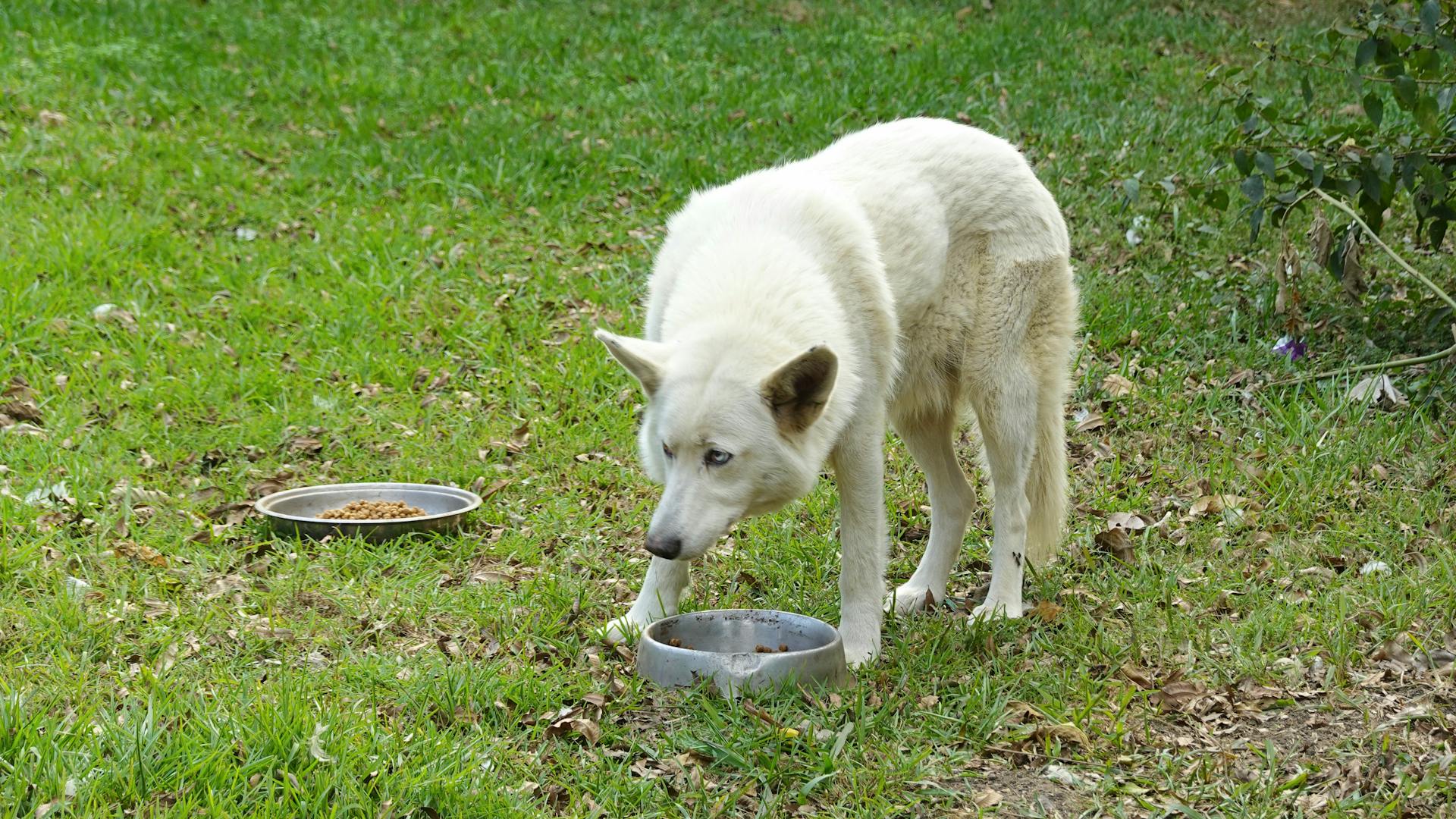
If you're a dog owner who's allergic to your furry friend, you're not alone. According to a study, at least 10% of people in the US suffer from dog allergies.
One way to alleviate symptoms is by switching to hypoallergenic dog food. This type of food is made with ingredients that are less likely to trigger allergic reactions.
Hypoallergenic dog food is formulated to reduce the amount of common allergens found in traditional dog food. These allergens include proteins like beef, dairy, and soy.
By feeding your dog a hypoallergenic diet, you can potentially reduce the amount of allergen exposure and alleviate symptoms.
Expand your knowledge: Can Dogs Be Allergic to Salmon Dog Food
Understanding Allergies
A food allergy in dogs is an immune reaction to a substance in their diet, not a digestive issue. This reaction can cause symptoms like rashes, swelling, itchy or tender skin, and gastrointestinal upsets.
Symptoms of a food allergy can be similar to those of environmental allergies, so it's essential to consult with a veterinarian to determine the cause. A food allergy is often caused by a reaction to a protein source, such as chicken, beef, lamb, or soy.
You might enjoy: Can Dog Food Cause Diarrhea in Dogs
Common protein sources that can cause an allergic reaction in dogs include chicken, beef, lamb, and eggs. Soy, wheat, and corn are also common allergens.
To diagnose a food allergy, a veterinarian may recommend a dietary elimination trial, also known as a food trial. This involves feeding a prescription hypoallergenic diet for 8 to 12 weeks, eliminating all other sources of food, including treats and human foods.
Here are some common signs of a canine food allergy or sensitivity:
- Rashes
- Swelling
- Itchy or tender skin
- Gastrointestinal upsets
If your dog is diagnosed with a food allergy, your veterinarian may recommend a limited ingredient diet, which is primarily composed of a main protein and a small handful of additional ingredients. This can help identify the specific allergen causing the reaction.
In some cases, a hydrolyzed diet may be recommended, where the protein is broken down into smaller peptides to reduce the risk of an allergic reaction.
You might like: Low Protein Food for Dogs Homemade
Types of Hypoallergenic Diets
There are several types of hypoallergenic diets that can help alleviate food allergies in dogs.
A limited ingredient diet is a great option, as it contains fewer ingredients, typically limiting the formula to one protein, carbohydrate, and/or fat. This can improve digestion and reduce the likelihood of a reaction.
Novel protein sources, such as venison, veal, kangaroo, and fish like salmon, can also be used to minimize or eliminate the chances of an allergic response.
Hydrolyzed proteins are another option, as they are broken down into smaller polypeptides through a process called protein hydrolysis, which can prevent the immune system from reacting to them.
Prescription or veterinary food is also available, which contains specific hypoallergenic ingredients or hydrolyzed protein, and can be a good option for dogs with severe allergies.
Here are some examples of hypoallergenic dog food types:
These are just a few examples of the types of hypoallergenic diets available, and it's always best to consult with a veterinarian to determine the best course of action for your dog's specific needs.
Nutritional Considerations
Zinc is an essential mineral that plays a crucial role in maintaining skin and coat health in dogs. It also helps mitigate inflammatory and immune reactions.
Zinc can be found in dog food as a mineral supplement or through ingredients like lamb meat, which is high in zinc.
Some dog foods, like Addiction Zen Vegetarian Sensitive Care, have premium protein sources that dogs are rarely allergic to. This can be beneficial for dogs with allergies.
Nutrients in Diets
Zinc is a crucial nutrient in hypoallergenic dog foods, helping to maintain skin and coat health.
Zinc also plays a role in mitigating inflammatory and immune reactions, making it an essential component in calming sensitive skin.
Lamb meat is a great source of zinc, as it's high in this mineral.
Vitamin A is involved in cell growth and division, as well as hair growth and skin maintenance.
Fish oils like cod oil are excellent sources of vitamin A, which can help clear up skin damage caused by food allergies.
Adding these nutrients to a hypoallergenic diet can make a big difference in a dog's overall health and well-being.
For your interest: What Food Is Good for Dogs Skin and Coat
Novel Carbohydrates

Novel carbohydrates are a great way to mix up your dog's diet, especially if they're sensitive to certain carbs. Some examples of novel carbohydrate ingredients include brown rice and sweet potato, as well as brewer's rice.
Dogs may become sensitive or allergic to certain carbohydrate sources in their diet. This can cause a range of issues, from digestive problems to skin irritation.
If you're looking to introduce novel carbohydrates into your dog's diet, it's a good idea to start with small amounts and monitor their reaction. Some dogs may be more sensitive than others.
Novel carbohydrates can be a great way to add variety to your dog's diet, but it's essential to introduce them gradually and under the guidance of a veterinarian.
Here are some examples of novel carbohydrate ingredients that may be suitable for dogs:
- Brown rice
- Sweet potato
- Brewer's rice
Plant-Based Sensitive Care
If your dog has a severe allergy to animal proteins, a plant-based diet can be a game-changer.
Limited ingredient diets are a common approach to reducing food-related allergic reactions in dogs. These diets typically consist of only one protein, carbohydrate, and/or fat source, making it easier to identify and avoid potential allergens.
Some plant-based dog foods, such as Addiction Zen Vegetarian's Skin & Coat Health Dry Dog Food, are rich in soy protein and formulated for comprehensive skin, coat, digestive, and heart health.
A hydrolyzed diet can also be an option, where the protein is broken down into smaller components that the body no longer recognizes as a problem.
Novel carbohydrates, such as brown rice and sweet potato, can be used to avoid sensitivity or allergic reactions to common carbohydrate sources.
Here are some key features of plant-based sensitive care dog foods:
These plant-based diets can be a great option for dogs with extreme animal protein allergies, but it's essential to introduce them under the supervision of a veterinarian.
Symptoms and Issues
Dogs suffering from food allergies often experience painful and unpleasant skin-related problems, including red and inflamed skin, severe itchiness, fur loss, flaky and dry skin, bumpy rashes, and other skin conditions.
Digestive issues are also common, with symptoms like loose and runny stools, vomiting, and lingering gassiness. Some dogs may even experience an intolerance to a certain food, which can cause discomfort and digestive problems.
Behavioral changes can also occur, such as lethargy or anxiety, as a result of the dog not feeling well due to food allergies.
On a similar theme: Do Dogs Have Allergies to Food
Is My Allergic?
Dogs suffering from food allergies often experience painful and unpleasant skin-related problems. Red and inflamed skin, severe itchiness, fur loss, flaky and dry skin, and bumpy rashes are all common symptoms.
Chicken is a common culprit behind food allergies in dogs, especially if they're eating a lot of it. Chicken-based foods can be particularly problematic due to their high levels of inflammatory omega-6 fatty acids.
Suggestion: Dog Food for French Bulldogs with Allergies
If your dog is experiencing symptoms of allergies, try switching them to a food without chicken to see if the symptoms clear up. This simple test can be a great way to determine if chicken is the allergen at play.
Severe itchiness and skin conditions can be a real challenge for both dogs and their owners. By identifying the allergen and switching to a more suitable food, you can help alleviate your dog's discomfort and improve their overall health.
A fresh viewpoint: Just Food for Dogs Diy Chicken Recipe
Symptoms
Dogs with food allergies often experience painful and unpleasant skin-related problems, such as red and inflamed skin, severe itchiness, fur loss, flaky and dry skin, and bumpy rashes.
Digestive issues are also common, with symptoms including loose and runny stools, vomiting, and lingering gassiness.
Red and inflamed skin, severe itchiness, fur loss, and flaky and dry skin are all symptoms of food allergies in dogs.
Other skin issues, such as rashes and painful red spots, are also possible.
Discover more: Bernese Mountain Dog Health

Dogs may also experience digestive problems, such as vomiting and watery stool.
If your dog is constantly experiencing these symptoms, it's essential to consult your veterinarian to rule out other medical issues.
A protein source is the most common cause of dog food allergies, so switching to a different protein source may help alleviate symptoms.
Common symptoms of food allergies include rashes, painful red spots, severe itchiness, dry skin, fur loss, and other skin issues, as well as digestive problems like vomiting, watery stool, and excessive gas.
If your vet suspects food allergy is involved, they may have your dog try an alternate recipe with a different protein source, such as fish or kangaroo.
Readers also liked: Health Problems in Labrador Retrievers
Behavioral Issues
Dogs with severe food allergies may exhibit behavioral changes due to feeling unwell. Lethargy is a common symptom, making it difficult for them to engage in their usual activities.
Their anxiety levels may also increase, causing them to become irritable or withdrawn. This can be challenging for owners who are trying to provide comfort and reassurance.
Choosing a Hypoallergenic Food
Dairy, soya, beef, fruits & vegetables, eggs, chicken, and lamb are common problem foods for dogs.
To choose a hypoallergenic food, consider a limited ingredient diet, which typically consists of one protein, carbohydrate, and/or fat source. This can help reduce the occurrence of food-related allergic reactions in dogs.
Look for foods that are grain-free, wheat-free, and made with premium ingredients. Some examples of hypoallergenic dog foods include Instinct Raw Boost Adult Grain-Free Real Salmon Recipe and Merrick Limited Ingredient Diet Grain-Free Real Lamb Recipe.
Here are some key considerations when choosing a hypoallergenic food:
- Single protein source (e.g. lamb, turkey, pork)
- Single carbohydrate source (e.g. sweet potato, squash)
- No common allergens (e.g. beef, dairy, chicken)
- Premium ingredients
- Easy to digest
By considering these factors, you can help identify a hypoallergenic food that meets your dog's needs and reduces the risk of allergic reactions.
How to Choose
Choosing a Hypoallergenic Food can be a daunting task, but let's break it down. First, identify common problem foods for dog allergies, which include wheat, dairy, soya, beef, fruits & vegetables, eggs, chicken, lamb, and soy.
To narrow down your options, consider the ingredients in the food you're considering. Look for high-quality animal proteins, such as pork, lamb, duck, and beef, which are found in ACANA Singles recipes.
A single animal protein source is a key characteristic of these recipes, making it easy to perform an elimination test to confirm if your dog is allergic to a particular ingredient.
When choosing a hypoallergenic food, consider the type of food as well. Dry kibble, like ACANA Singles, is a popular option, and it's easy to digest.
Some common fillers to avoid in hypoallergenic food include corn and wheat, which are often found in lower-quality dog foods.
Here are some key characteristics of ACANA Singles recipes:
All four ACANA Singles recipes are 100% chicken-free, making them a great option for dogs with chicken allergies.
Merrick Grain-Free Real Lamb Recipe
If you're looking for a hypoallergenic food that's gentle on your dog's skin, Merrick's Limited Ingredient Diet Grain-Free Real Lamb Recipe is a great option. This canned food is made with deboned lamb as the first ingredient, which is a great protein source for dogs.
See what others are reading: How Much to Feed a Great Pyrenees
The recipe is free of common allergens like poultry, potato, corn, soy, and peas, making it a great choice for dogs with sensitive stomachs. Merrick offers three unique recipes, but the lamb recipe stands out for its high protein content and grain-free formula.
Here are some key benefits of Merrick's Limited Ingredient Diet Grain-Free Real Lamb Recipe:
- First five ingredients: Deboned lamb, water, lamb liver, natural flavor, salt
- Type: Wet food
- Life stage: Adult
- Best for: Limited-ingredient diets, high-protein diets, single-protein diets
- Flavors: Real Lamb Recipe, Chicken & Brown Rice Recipe, Turkey & Brown Rice Recipe
This recipe is also easy to digest, making it a great choice for dogs with sensitive stomachs.
Go! Limited Ingredient Grain-Free Turkey Recipe
If you're looking for a hypoallergenic dog food that's gentle on your pup's digestive system, GO! Solutions Sensitivities Limited Ingredient Grain-Free Turkey Recipe is a great option.
This food is made with a single-animal protein source, turkey, and is free of chicken, potato, grain, and soy. The first five ingredients are deboned turkey, turkey meal, tapioca, peas, and lentils.
One of the benefits of this food is that it's available in smaller 3.5-pound bags, making it more manageable to try out different flavors with your dog. GO! Solutions offers five recipes to choose from, including turkey, venison, lamb, salmon, and duck.
Take a look at this: Turkey Meat for Dogs
Here are some key features of the GO! Solutions Sensitivities Limited Ingredient Grain-Free Turkey Recipe:
- First five ingredients: Deboned turkey, turkey meal, tapioca, peas, lentils
- Type: Dry kibble
- Life stage: All Life Stages
- Best for: Single animal protein diets, grain-free diets, skin and coat health
- Flavors: Turkey, Venison, Lamb, Salmon, Duck
With its high-quality ingredients and limited ingredient list, GO! Solutions Sensitivities Limited Ingredient Grain-Free Turkey Recipe is a great choice for dogs with sensitivities.
How We Chose
We thoroughly researched numerous dog food brands and their recipes to select the top foods for dogs with allergies. Our research included both big-name and lesser-known brands.
We had our own dogs taste-test many formulas to get a firsthand look at their preferences. Their palatable reactions helped us narrow down the options.
Multiple flavor options and size options were also important considerations. This ensures that owners can find a food that suits their dog's individual needs.
We prioritized premium ingredient quality in our selection process. This means choosing foods made with wholesome, easily digestible ingredients.
Price was another key factor in our decision-making process. We looked for foods that offer good value for the money.
A different take: Bichon Frise Foods to Avoid
Frequently Asked Questions
What foods help dogs with itchy skin?
Dogs with itchy skin may benefit from novel protein sources like fish, pork, lamb, venison, duck, or rabbit, as well as dry kibbles with single meat and starchy vegetable sources
What is the best dog food for dogs with chicken allergies?
The best dog food for dogs with chicken allergies is ACANA Singles Limited Ingredient Diet Pork & Squash Recipe. This formula, along with three others in the ACANA Singles line, offers excellent chicken-free options for dogs with allergies.
Sources
- https://en.wikipedia.org/wiki/Hypoallergenic_dog_food
- https://www.darwinspet.com/health-issues/choose-best-hypoallergenic-dog-food-allergies.html
- https://nutrience.com/products/sensitive-skin-stomach/
- https://petslovefresh.com/blogs/news/what-is-hypoallergenic-dog-food
- https://time.com/shopping/article/best-dog-food-for-allergies/
Featured Images: pexels.com


